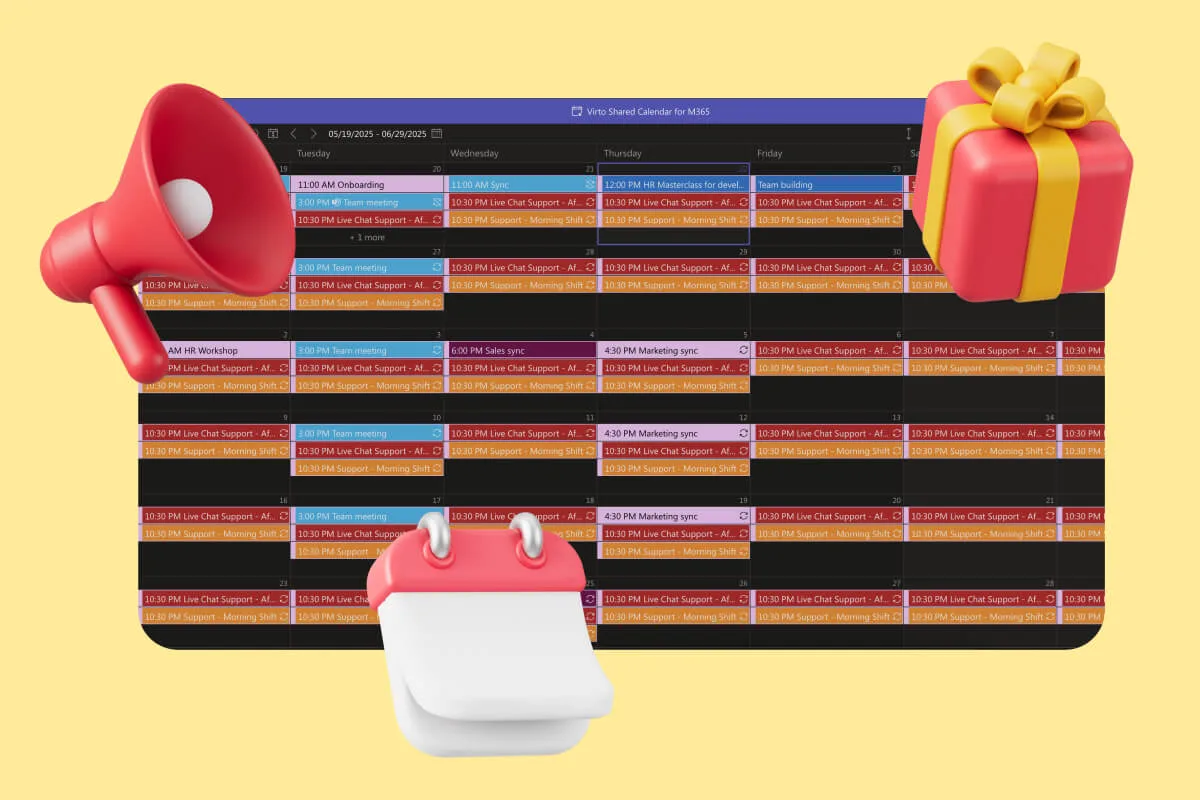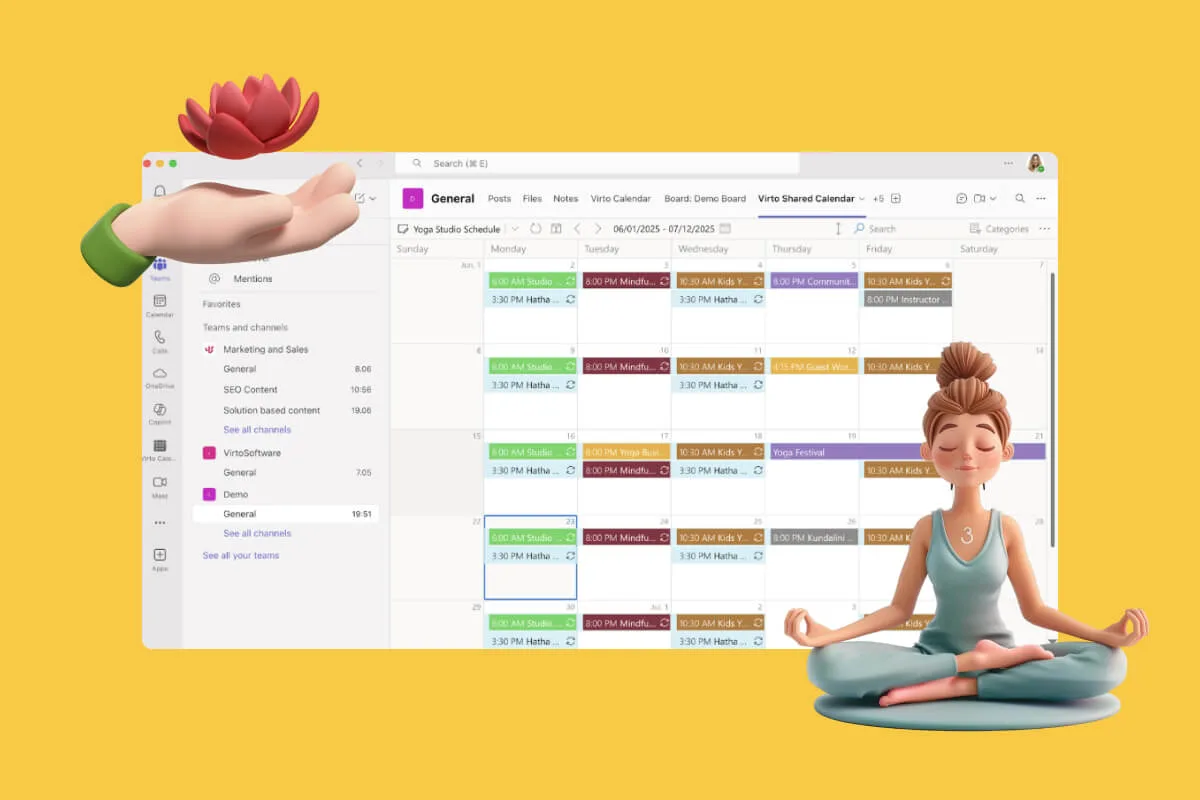Running a small business is tough enough—juggling invoices, keeping track of projects, managing your team—without clunky systems slowing you down. That’s why choosing the right small business management software isn’t just a nice-to-have, it’s mission-critical for keeping your company efficient and ready to grow.
The challenge? There’s no shortage of options. From all-in-one business management software for small business that promises to do everything under one roof, to specialized management tools for small business that focus on just one area—you’ll find more choices than you can count. And while some brands market themselves as the best small business management software, what actually works for your team depends on your goals, budget, and existing setup.
That’s exactly why we created this guide. Here, you’ll find a clear, no-fluff look at the best software for small business management—including their key features, benefits, and how well they integrate with the systems you already use. Whether you’re searching for a simple software to manage small business finances, a complete small business software solution, or just want to know which small biz management software is worth your time, we’ve got you covered.
What is Small Business Management Software?
At its core, small business management software is like a digital toolbox—an integrated set of apps and features designed to help small companies automate, organize, and streamline their daily operations. Instead of bouncing between spreadsheets, emails, and sticky notes, you get one hub to run it all. Think of it as the command center for your business.
Whether you call it small biz management software, software to manage small business, or simply management software for small business, the idea is the same: make your work life easier and free up more time to focus on growth. These small business management tools cover everything from money management to people management—and even a bit of future-proof decision-making.
Here’s what most software for small business management includes:
- Finance & accounting
Say goodbye to manual spreadsheets. Small business software management automates invoices, tracks income and expenses, helps with tax prep, and keeps your cash flow visible in real time. - Customer relationship management (CRM)
With a built-in CRM, small business manager software keeps all your customer data in one place. You can track interactions, manage sales pipelines, and run marketing campaigns without scrambling through inboxes. - Human resources (HR)
Hiring, onboarding, timesheets, payroll—it’s all there. Business management software for small business helps you manage your team with less paperwork and fewer headaches. - Project Management
From task lists to timelines, management software small business tools make it easier to assign resources, set deadlines, and actually deliver projects on time. - Analytics & Reporting
The best small business management solutions don’t just store your data—they turn it into insights. With dashboards and reports, you can see what’s working, what’s not, and make smarter decisions.
In short, whether you’re running a growing startup or a lean small company, the best business management software for small business ties all your processes together—so you can spend less time managing chaos and more time managing success.
Why Use Small Business Management Software?
So, why bother with small business management software in the first place? Because running a business without it is like trying to fix a car with only a spoon and duct tape—you might get somewhere, but it’s messy, slow, and exhausting. The right small business management solutions give you tools that not only make life easier, but also help your company grow without burning out your team (or your budget).
Here are the biggest perks of using software for managing small business:
| Benefit | How small business management tools help |
| ✅Boosted efficiency | With management software for small business, all those repetitive, boring tasks—like data entry, invoicing, or scheduling—get automated. That means your team spends less time on busywork and more time on things that actually move the needle. |
| ✅Lower costs | Manual work = mistakes = money down the drain. By switching to business management software small business tools, you streamline processes, cut down on errors, and reduce unnecessary operating costs. |
| ✅Happier customers | Centralized small business manager software makes it easy to know your clients inside and out. You’ll be faster, more accurate, and more personal in every interaction—which translates into loyal, satisfied customers. |
| ✅Smarter decision-making | Access to real-time dashboards and reports is one of the biggest superpowers of the best management software for small business. When you have the numbers at your fingertips, you can make confident decisions instead of flying blind. |
| ✅Room to grow | Most modern small company management software comes with modular or scalable features. Start with the basics, then add new functions—like HR tools or advanced analytics—as your company grows. It’s flexible enough to keep up with you. |
Whether you’re looking for the best software to manage small business or just a flexible small business software solution, these benefits make it clear: investing in the right tools pays off quickly.
Explore Our Use Cases for Small Business Management Software
The Best Small Business Management Software
So, what is the best software for small business management? Truth is, it depends on what you need most. Some small companies want all-in-one small business management solutions, others just need a killer accounting app or a lightweight project tracker. Below, we’ll look at some of the most popular small business management tools and how they stack up.
Popular picks for small business software management
- Zoho One
A true all-in-one suite with over 40+ apps covering CRM, finance, HR, marketing, and more. It’s flexible, scalable, and loved by teams that want software to manage small business without juggling dozens of separate subscriptions. Downsides? With so many features, it can feel overwhelming at first. - QuickBooks
The go-to small business software solution for accounting. Perfect for tracking expenses, invoices, payroll, and taxes. It integrates well with other management tools for small business, though it’s mainly finance-focused. - Trello
A lightweight, visual project management app. Great if you want to manage small business software that keeps tasks organized without overcomplicating things. It’s free to start, but limited in advanced features compared to all-in-one small biz management software. - Homebase
Built for small teams that need small business manager software for scheduling, time tracking, and HR basics. It’s simple, user-friendly, and especially handy for service-based businesses like retail or restaurants. - Odoo
An open-source small company management software that’s highly customizable. From inventory to CRM to finance, you can build exactly what you need. Great flexibility, but setup and customization can take time. - FreshBooks
Another favorite in business management software small business accounting. It shines in invoicing and expense tracking, with a clean, user-friendly interface. Best for freelancers or very small teams. - HubSpot
Famous for CRM and marketing automation, but also offers sales and service tools. If client relationships and growth marketing are your focus, HubSpot is one of the best small business management software picks.
Comparison table: best software to manage small business
| Software | Best For | Integrations | Ease of Use | Pricing | Free Version | AI Features | Scalability |
| Zoho One | All-in-one small business management software | Huge ecosystem | Moderate learning curve | Mid-range | Trial only | Zoho AI (Zia) for analytics, predictions | Very high |
| QuickBooks | Finance & accounting | Strong finance integrations | Easy | $$ | No | AI for expense categorization | Medium |
| Trello | Project management | 200+ integrations | Very easy | Free–affordable | Yes | Basic AI task suggestions (via Power-Ups) | Medium |
| Homebase | Scheduling & HR | Payroll, POS integrations | Very easy | Affordable | Yes | AI for shift optimization | Medium |
| Odoo | Fully customizable ERP/CRM | Open-source modules | Steeper learning curve | Free–$$ | Yes (Community Edition) | AI-driven reporting & forecasting | Very high |
| FreshBooks | Invoicing & expenses | Payment processors, banks | Very easy | $ | Trial only | AI for invoice automation | Low–medium |
| HubSpot | CRM & marketing | Strong integrations (Salesforce, Gmail, etc.) | Easy | Free–$$$ | Yes | AI for email, lead scoring, automation | High |
👉 Find more opinions on best small business management software choices in a Reddit discussion and Quora thread.
How small business software management helps you save
Here’s the best part: these management tools for small business don’t just organize your company—they save money while boosting efficiency. By automating repetitive tasks, preventing mistakes, and centralizing data, you cut down on hidden costs like wasted hours, manual errors, and siloed systems.
And with built-in AI now appearing in the best business management software for small business—from smarter accounting suggestions in QuickBooks to HubSpot’s AI-powered lead scoring—even small teams can get enterprise-level insights without paying enterprise-level prices.
👉What is the best software for small business management? For all-in-one power: Zoho One or Odoo. For finances: QuickBooks or FreshBooks. For CRM: HubSpot. For projects: Trello.
👉What is the best app to use for a small business? It depends on your focus, but the best small business software solution is usually the one that fits seamlessly with your current workflow.
How to Choose the Best Small Business Management Software
Picking the right small business management software isn’t just another to-do on your list—it’s a game-changing step toward real automation, smarter workflows, and steady business growth. But with so many small business management tools out there, how do you know which one is actually the best software to manage small business for your needs?
Here’s a simple checklist to guide your decision:
1. Define your business needs
Before shopping around for management software for small business, take a step back and map out the processes you want to automate. Otherwise, you risk paying for features you’ll never use.
Key areas to think about:
- Finance & accounting → income/expense tracking, reporting, tax prep
- Customer management (CRM, sales & marketing) → better client interactions, targeted campaigns
- Inventory & logistics → stock tracking, order management, supply chain visibility
- HR & Team management → hiring, payroll, employee records, compliance
Clear priorities = the right small business software solution at the right price.
2. Think about scalability
Your company today is not your company tomorrow. The best small business management software should fit your current needs and adapt as you grow. Look for solutions that:
- Support adding more users without crazy costs
- Offer plug-ins, modules, or extensions for new business functions
- Provide flexible architecture with API connections to integrate new systems
Scalable small business management solutions = no messy migrations later.
3. Evaluate your budget
Money matters—especially for a small business. When comparing business management software small business options, don’t just check the subscription price. Consider:
- License model → one-time payment vs. monthly/annual subscription
- Extra costs → training, onboarding, technical support, upgrades
- ROI → how quickly the software small business management tool will save you time or reduce costs
Sometimes the best management software for small business is not the cheapest, but the one that pays for itself fastest.
4. Check integrations
Even the smartest small business manager software is useless if it doesn’t talk to the systems you already rely on. Make sure the platform:
- Works with your existing CRM, accounting, or warehouse software
- Provides APIs or ready-made connectors
- Allows real-time data syncing
Strong integrations = smoother workflows across all departments.
5. Look at support & training
The best tool in the world won’t help if your team can’t figure it out. Good small business software management providers make adoption easy with:
- Reliable customer support (chat, email, or phone)
- Tutorials, guides, and video resources
- Optional training sessions or consultations
Good support turns your small business management software from “complicated tech” into “everyday lifesaver.”
👉Bottom line: The best software for small business management is the one that fits your needs today, scales with you tomorrow, and doesn’t drain your wallet in the process.

Decision matrix to choose software for small business management
| Criteria | What to check | Why it matters |
| Business Needs | Does the management software for small business cover the processes you need most (finance, CRM, inventory, HR)? | Avoid paying for unnecessary features and choose the right small business software solution for your workflow. |
| Scalability | Can the small business management software grow with you? (Add users, modules, or integrations without big costs.) | The best small business management software adapts as your company expands, saving you from switching later. |
| Budget | What’s the pricing model (subscription vs. one-time)? Any hidden costs for training, upgrades, or support? | The right software small business management tool should offer quick ROI, not surprise expenses. |
| Integrations | Does it connect with your current CRM, accounting, or warehouse systems? Are APIs or ready-made connectors available? | Strong integrations make business management software for small business more efficient and reduce manual work. |
| Support & training | What support channels exist (chat, phone, email)? Are tutorials, guides, or onboarding sessions included? | Quality support makes adopting small business manager software smoother and prevents downtime. |
👉 Pro tip: the best software to manage small business is rarely “one-size-fits-all.” Instead, it’s the platform that checks most of these boxes for your specific needs.
Expanding Small Business Management with Virto Software
If your company is already working inside Microsoft 365 and Microsoft Teams, you’re halfway there. Adding the right apps and integrations can turn your familiar workspace into a powerhouse for small business management software—without the overhead of expensive enterprise tools. That’s where VirtoSoftware comes in.
Virto offers a suite of apps designed to extend M365 in ways that make sense for small businesses. From calendars to task boards to automated alerts, these tools act as cost-effective small business management solutions that save time, reduce errors, and keep your team in sync.
Here’s how Virto’s apps make a difference:
- Visual task management
Virto Kanban Board App for SharePoint Online & Microsoft 365 transforms SharePoint lists into drag-and-drop Kanban boards. For teams using Teams, Virto Kanban Board App for Microsoft Teams is an instant upgrade in how you organize and track tasks—simple, visual, and transparent.

Improve Your Small Business Management Software with Virto Apps
- Calendar consolidation
When it comes to scheduling, one size doesn’t fit all. That’s why Virto offers two versions of the Virto Calendar App: one for Microsoft Teams, and another for SharePoint Online and Microsoft 365. Both are designed for bigger teams that need serious scheduling power—bringing multiple calendars, lists, and data sources into one customizable view. If your business runs on complex projects and cross-department planning, this is the heavy-duty tool that keeps everything aligned.

If you’re after something simpler, the Virto Shared Calendar for Microsoft Teams is the lightweight, laconic version. It’s easy to roll out and perfect for smaller teams that just need a clear, no-fuss way to see Outlook, Google Calendar, and SharePoint events in one place. Take a closer look in our detailed breakdown.

Between the Virto Calendar App (for large-scale planning) and the Virto Shared Calendar (for quick, everyday coordination), small businesses get flexible small business management software choices tailored to how much scheduling muscle they actually need.
Improve Your Small Business Management Software with Virto Apps
- Automated notifications & reminders
Deadlines, meetings, approvals—Virto Notifications & Reminders App for Microsoft Teams makes sure nothing goes unnoticed by sending alerts straight into Teams or via email. Think of it as your built-in small business manager software assistant.

- Custom forms without coding
Virto Form Designer for SharePoint Online & Microsoft 365 helps you build tailored SharePoint forms without touching code. It’s perfect for collecting data, managing requests, or streamlining approvals. A flexible small business software solution that anyone can set up.

Why VirtoSoftware solutions work for small businesses
✅Seamless integration → Apps connect directly with Microsoft Teams, SharePoint, and Outlook, giving you a unified software for small business management environment.
✅Affordable pricing → Starting at just $2 per user/month, Virto provides the best business management software for small business teams on a budget.
✅Easy to use → With an intuitive interface and clear documentation, Virto apps are quick to roll out and require little to no training.
✅Support & security → All apps follow Microsoft’s security standards and come with 24/7 support.
Wrapping Up
Choosing the right small business management software isn’t just a tech decision—it’s a growth strategy. The tools you pick shape how efficiently your team works, how smoothly your processes run, and how well you serve your customers. Get it right, and you’ll spend less time fighting spreadsheets and more time scaling your business.
The best small business management software helps you automate the boring stuff, cut costs, and make smarter decisions with real-time insights. It also gives your customers a better experience—because when your back-end runs smoothly, your front-end shines.
And here’s the good news: you don’t have to break the bank to get there. With VirtoSoftware apps—like the Virto Calendar App (for Microsoft Teams or for SharePoint Online and Microsoft 365), the Virto Shared Calendar for Teams, Kanban Boards, Notifications, and Form Designer—you get flexible, affordable small business management solutions that plug right into Microsoft 365. No massive enterprise overhead, just practical tools that fit naturally into the systems you already use.
So, if you’re looking for software for managing a small business that’s powerful yet budget-friendly, VirtoSoftware is worth a closer look. Seamless integration with Microsoft Teams and SharePoint means you can boost productivity, stay organized, and grow your business—without adding unnecessary complexity.
This is just one piece of the puzzle. Don’t miss our other articles:








